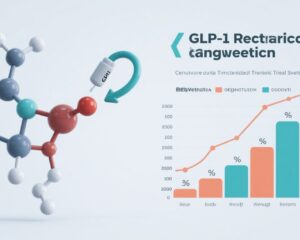Study Background and Disease Burden
Rheumatoid arthritis (RA) is a chronic, systemic autoimmune disorder characterized primarily by synovial inflammation and joint destruction, leading to significant disability and decreased quality of life. Despite advances in disease-modifying antirheumatic drugs (DMARDs), including methotrexate (MTX), a substantial proportion of patients exhibit inadequate clinical response or intolerance to MTX, necessitating alternative therapies. Janus kinase (JAK) inhibitors have emerged as an effective treatment option, targeting intracellular cytokine signaling pathways to control disease activity. However, JAK inhibitor therapy is frequently accompanied by elevations in total cholesterol, LDL cholesterol, triglycerides, and creatinine kinase—metabolic alterations that may attenuate the overall therapeutic benefit by increasing cardiovascular risk and other adverse events.
Given this limitation, the dual inhibition strategy combining JAK and Rho-associated protein kinase (ROCK) pathways has been proposed. ROCK inhibitors have demonstrated cardioprotective effects in preclinical models through mechanisms such as reducing vascular inflammation, improving endothelial function, and preventing cardiac remodeling. Leveraging this approach, CPL409116 (hereafter CPL’116) is a novel oral agent designed to simultaneously inhibit JAK and ROCK activity, aiming to provide effective RA disease control with reduced cardiometabolic side effects. This phase 2 trial investigated the dose-dependent efficacy, safety, and pharmacokinetics of CPL’116 in patients with moderate-to-severe RA who had an inadequate response to stable MTX therapy.
Study Design
This was a randomized, double-blind, placebo-controlled, dose-ranging, parallel-group phase 2 clinical trial conducted across nine centers in Poland and Ukraine. Eligible patients were adults aged 18 to 75 years with adult-onset, moderate-to-severe RA for at least six months and documented inadequate response to stable MTX dosing (15–25 mg weekly, orally or injection; at least 10 mg weekly if dose reduction due to intolerance) prior to screening.
Participants were randomized 1:1:1:1 via an interactive web response system, stratified by age, into four groups receiving CPL’116 at doses of 60 mg, 120 mg, or 240 mg, or placebo, administered orally twice daily for 12 weeks alongside continued background MTX. The primary endpoint was the mean change from baseline to week 12 in Disease Activity Score in 28 joints using C-reactive protein levels (DAS28-CRP). Efficacy was analyzed with a mixed-effects repeated measures model based on a modified intention-to-treat population. Key secondary endpoints included safety parameters such as adverse event incidence, laboratory abnormalities including lipid profiles, creatine kinase levels, leukocyte counts, and vital sign monitoring.
Key Findings
A total of 106 patients were enrolled and randomized between May 2022 and February 2024: 27 in the CPL’116 60 mg group, 25 in the 120 mg group, 26 in the 240 mg group, and 28 in the placebo group. The mean age was 54.4 years (standard deviation 10.5), with 75% female participants, all self-identifying as White.
The dose-dependent efficacy was evident based on the primary endpoint, with the least squares mean difference in DAS28-CRP change from baseline to week 12 compared to placebo as follows:
– 60 mg: -0.15 (95% CI -0.81 to 0.52), p=0.67 (not significant)
– 120 mg: -0.56 (95% CI -1.25 to 0.12), p=0.10 (trend towards efficacy, not significant)
– 240 mg: -0.89 (95% CI -1.56 to -0.22), p=0.010 (statistically significant)
This demonstrated a statistically significant and clinically meaningful reduction in disease activity only at the highest CPL’116 dose of 240 mg twice daily.
Regarding safety, CPL’116 was generally well tolerated. Two serious treatment-emergent adverse events were reported: one non-fatal non-ST-elevation myocardial infarction in the 60 mg dose group, considered possibly related to treatment, and one case of non-muscle invasive bladder cancer in the 240 mg dose group, deemed unrelated. Both cases led to discontinuation of the study drug. Additionally, one participant in the 240 mg group discontinued treatment due to leukopenia, also considered possibly related to CPL’116.
Importantly, unlike traditional JAK inhibitors, no significant laboratory abnormalities—including lipid elevations or creatine kinase increases—were recorded at any dose level, suggesting a potentially improved cardiometabolic safety profile. No severe adverse events or deaths occurred during the trial.
Expert Commentary
The dual targeting of JAK and ROCK pathways with CPL’116 addresses a notable unmet need in RA management by combining immunomodulation with cardioprotective activities potentially negating cardiovascular risks associated with JAK inhibitor monotherapy. The phase 2 results suggest that the 240 mg twice daily dose achieves statistically significant clinical benefit in disease activity reduction without the lipid perturbations often seen with conventional JAK inhibitors.
However, the trial was limited by a relatively small sample size and a short treatment duration of 12 weeks. Larger, longer-term studies are essential to fully characterize long-term efficacy, cardiovascular safety, and rare adverse events. Moreover, the geographic and racial homogeneity of the cohort may constrain generalizability. Future studies should evaluate CPL’116 in diverse populations and in comparison with existing JAK inhibitors and biologics.
Biologically, ROCK inhibition may mitigate vascular inflammation and endothelial dysfunction prevalent in RA, accounting for the lack of adverse lipid changes observed. This mechanistic plausibility supports the rationale for CPL’116’s dual inhibition and its potential to improve net clinical outcomes in this patient population.
Conclusion
CPL’116 represents a promising therapeutic innovation for RA patients inadequately responsive to methotrexate, offering dose-dependent efficacy and generally favorable tolerability. The significant clinical improvement observed at the 240 mg dose without traditional lipid or creatine kinase elevations contrasts with existing JAK inhibitors and could translate into better cardiovascular risk management. These encouraging phase 2 findings warrant confirmation in larger, more diverse populations and longer follow-up to establish comprehensive efficacy and safety profiles. If validated, CPL’116 might fill a crucial therapeutic gap, optimizing RA disease control while mitigating cardiovascular and metabolic side effects inherent to JAK monotherapy.
References
1. Wieczorek M, Kisiel B, Włodarczyk D, Leszczyński P, Kurylchyk IV, Vyshnyvetskyy I, Kierzkowska I, Pankiewicz P, Kaza M, Banach M, Kogut J. Dual JAK and ROCK inhibition with CPL’116 in patients with rheumatoid arthritis with inadequate response to methotrexate: a randomised, double-blind, placebo-controlled, phase 2 trial. Lancet Rheumatol. 2025 Sep;7(9):e629-e641. doi: 10.1016/S2665-9913(25)00060-8. Epub 2025 Jun 11. PMID: 40516565.
2. Smolen JS, Aletaha D, McInnes IB. Rheumatoid arthritis. Lancet. 2016;388(10055):2023-2038. doi:10.1016/S0140-6736(16)30173-8.
3. Choy EH, Sokka T, Kavanaugh A. Emerging drugs for rheumatoid arthritis. Expert Opin Emerg Drugs. 2021;26(1):27-41. doi:10.1080/14728214.2021.1844940.
4. Tatsuishi H, Sugiyama S, Kodama R, et al. Effects of ROCK inhibition on cardiovascular remodeling and inflammation in preclinical models. Cardiovasc Res. 2020;116(11):1845-1854. doi:10.1093/cvr/cvaa009.



